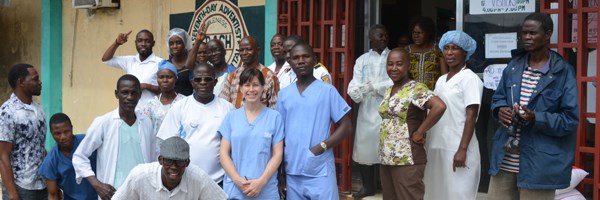
About the “Crisis” in the Words of Dr. Gillian
Ebola outbreak. 50-90% mortality. Spread by contact with body fluids. It’s not a zombie apocalypse, but pretty close to being one. How do you avoid contracting this deadly virus? Simple: don’t touch any sick people. Only, this isn’t a simple precaution for Liberia, which is quite simply the worst set-up for continued spread, misinformation, fear, violence, and death. Family members take care of family, which translates into cleaning up diarrhea, bathing the sick person, transporting them. Add entrenched burial rituals requiring cleaning and embalming of the body, ignorance and strong gossip networks. Sum of all evils = the virus jumps from family member to family member, parent to child, from patient to ill-equipped health care workers, and from there to the larger hospitals and to the next and to the next…
I came to Liberia to work in a small mission hospital in Monrovia, the capital city, in February of 2014. I had finished my general surgery training a few months prior and fulfilled my lifelong ambition to work in develop-ing countries to provide surgical care. An amazing administration and welcoming staff at SDA Cooper Hospital, a small hospital of 50 beds, greeted me. I came knowing that I would face certain dangers; I never imagined that I would face an outbreak of a deadly hemorrhagic virus. MSF (Doctors without Borders) has provided much needed extension to Ebola treatment centers with 125 beds that opened around August 20, followed by another 100 beds within a week. Only, they fill faster than the tents arise or staff can be found. Suspected cases are being turned away and sent home routinely.
We are routinely seeing patients at our door who have tried 3-4 other hospitals and been turned away due to no staff or due to concerning symptoms. Unfortunately, Ebola looks like malaria, sepsis, typhoid, and other virus-es. It’s difficult to separate those at risk due to Ebola exposure from those who just have one of the “normal” diseases. Due to fear of being turned away, people OFTEN lie about symptoms. Or, they do not tell the whole picture potentially infecting another group of people (i.e., the hospital staff).
What recourse then, except for these patients to go home and die? And infect the rest of the family? Can you understand the desperation? Even burial is becoming difficult: how to dispose of so many bodies rapidly?
Isolation and quarantine seem like a good idea, even if you condemn otherwise healthy people to stay in an exposed area. How long do we let this continue until we make a few sacrifices for the larger good? How would you feel if you were the one left behind?
The country is in a state of emergency, dissent among the people and media is being strongly discouraged; for right or wrong, such dissent is usually based on erroneous information and has lead to significant violence. The CDC estimates that there will be a total of 1.4 million cases of Ebola in Liberia and Sierra Leone if trends continue. All this just goes to illustrate how serious this crisis has become.
More Information
According to the World Health Organization (WHO), as of October 25, 2014, there have been 10114 probable, confirmed and suspected cases and 4219 deaths due to the Ebola virus outbreak. The WHO reports the following data regarding the outbreak in Liberia in particular:
- Suspected and Confirmed Case Count: 3896
- Suspected Case Deaths: 1281
Transmission of the virus remains high as religious, educational and political opinions about the virus differ in addition to poor sanitary conditions and lack of available health facilities and care.
Ebola Information:
- WHO Website: http://www.who.int/csr/disease/ebola/en/
- CDC Website: http://www.cdc.gov/vhf/ebola/index.html
- AHI Website: http://www.ahiglobal.org/main/ebola-crisis/
Press:
- http://www.ahiglobal.org/main/ebola-crisis/
- http://eud.adventist.org/news/detail/date/2014/08/19/cooper-adventist-hospital-in-liberia-remaining-open-during-epidemic/
- http://www.denverpost.com/news/ci_26394860/colorado-doctor-helping-sick-ebola-stricken-africa
- http://spectrummagazine.org/blog/2014/09/08/dispatches-ebola-hit-liberia
- http://www.sbsun.com/health/20140817/loma-linda-university-grads-staying-in-ebola-plagued-region
